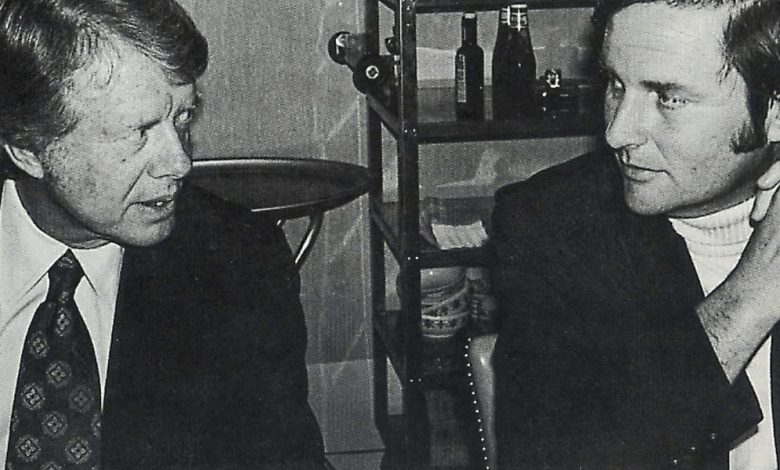Jimmy Carter open but ‘never irrelevant’

Always the underdog, Jimmy Carter served a tumultuous tenure in the White House. His presidency was beset by rising interest and inflation rates, gas pump lines, and the Iran hostage crisis that eventually led to his re-election defeat.
But he rose to even greater heights in his post-presidency career, dedicating another four decades to serving as the international envoy for peace and democracy. James Earl Carter Jr., a peanut farmer who became the 39th President of the United States, received the 2002 Nobel Peace Prize.
—
EDITOR’S NOTE – Walter Mears was a special correspondent for the Associated Press who won a Pulitzer Prize for his coverage of the 1976 presidential campaign. Before his death in 2022, Mears wrote this retrospective article in recognition of Carter, who entered hospice on February 18.
—
Beaten by Ronald Reagan in the 1980 election, Carter at 56 was a politician with only a past and “a potentially empty life” ahead of him. Then in 1982 he organized the Carter Center in Atlanta.
It made him travel, negotiate, lead election observation teams and speak out, often to the discomfort or even resentment of the government he once led. Carter’s Nobel citation recognized “his tireless efforts over decades” to resolve conflicts, promote democracy, and promote economic development.
The man who admitted that some saw him as a “failed president” has made himself the most active and internationally active ex-president. “My role as a former president is probably superior to that of other presidents,” he said in a 2010 television interview.
When he ran for one term as Georgia’s former governor, Carter was such an unlikely candidate that he said his mother asked him, “President of what?”
To answer that and his almost invisible level of fame, he began campaigning early. Carter walked about 50,000 miles campaigning, his duffel bag over his shoulder.
He won the Democratic nomination and challenged President Gerald Ford, Nixon’s appointed vice president.
Ford had pardoned Nixon for all Watergate crimes. After Watergate, Carter was the anti-Richard Nixon figure. “I will never lie to you guys,” he told voters. But Carter was elected by just 2 percentage points.
The newly elected President and wife, Rosalynn, avoided the limousine and walked from the Capitol to the White House after his inauguration, trying to drop some of the pomp surrounding the presidency. But his solo style and unintentional snubs left him lacking political allies when he needed their help.
Nonetheless, Carter’s tenure left milestones such as the Israeli-Egyptian peace accord that he worked out in personal negotiations at Camp David in 1978.
He gained the beginnings of an energy saving policy. He obtained ratification of the treaties that gave US control of the Panama Canal. He opened full diplomatic relations with China. The Departments of Energy and Education were created. But his administration struggled, and Carter shook up his cabinet amid a “crisis of confidence.”
And then it got even worse.
On November 4, 1979, Iranian protesters burst into the US Embassy in Tehran, instigated by their ayatollah to avenge the exiled former Shah’s entry into the United States for medical treatment. 52 Americans were held hostage for more than a year. Carter tried to negotiate, and when that didn’t work, he ordered the military rescue attempt, which failed disastrously in the desert in April 1980.
Eight Americans were killed in the attempt. It was Carter’s darkest hour.
The hostage crisis overshadowed and essentially crippled Carter’s reelection campaign. Senator Edward M. Kennedy challenged him in the Democratic primary.
After that things went uphill against Reagan. Carter only brought six states to Reagan’s 44.
Minutes after Reagan’s inauguration on January 20, 1981, the hostages were freed after 444 days of captivity. Carter’s first major act as ex-president was Reagan’s special envoy to welcome the freed hostages to Wiesbaden, Germany the next day.
Jimmy Carter, the only nicknamed president, was born in tiny Plains, Georgia, where he arranged for his burial. The father, after whom he was named, was in the peanut business with a farm and warehouse. His father, brother Billy, and two sisters all died of pancreatic cancer.
Carter graduated from the US Naval Academy in 1946, the year he married Rosalynn Smith, also from Plains. They had three sons and a daughter, Amy, the youngest, who went to the White House with them.
Carter spent nearly seven years in the Navy’s nuclear submarine force and resigned to take over the family business after his father died in 1953. His first political post was in the Georgia Senate. Carter, a moderate Democrat with a New Southern image, was elected governor of Georgia in 1970, succeeding segregationist Lester Maddox, and earned his first national grade when he declared in his inaugural address that “the days of racial discrimination are over “.
After losing his run for president, a devastated Carter retired to Plains to start “an entirely new, unwanted” chapter in his life.
He founded the Carter Center, which he later said offered “excellent opportunities to do good.” He and Rosalynn also worked with Habitat for Humanity, building homes for the poor in the United States and abroad.
Carter was a tireless peacemaker, bypassing the usual diplomatic channels and going, as he said in 1994, “where others don’t go” — places like Ethiopia, Liberia and North Korea, where he secured the release of an American jailed after 2010 over the border hiked.
He helped oversee the democratic elections in Nicaragua and Haiti, as well as the first Palestinian elections. In all, he took part in 39 of the Centre’s 100 election observation trips.
Carter said his center “filled vacuums in the world. If the United States doesn’t deal with trouble spots, we go there.”
And not always quiet.
He traveled to Cuba in 2002, met with Fidel Castro and then gave a televised address calling for an end to the US trade embargo. He compared Israeli policy towards the Palestinians to apartheid. He denounced the Iraq war as “based on lies”. He said George W. Bush was the worst president in history on foreign policy matters.
That prompted a Bush White House spokesman to call Carter “irrelevant.”
He could be pushy, a freelance diplomat who annoyed more than one administration.
But never irrelevant.



